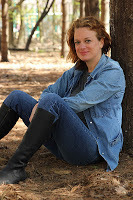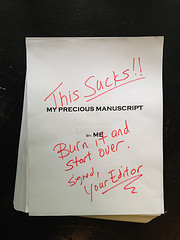Weathering Reviews and Taking Criticism

As a kid, I read a ton (a TON) of horse stories. It's a genre that I don't believe will ever go out of style, so I'm happy to have Jennifer Lyne here to post at The Bookshelf Muse. Her new book, Catch Rider
 , has recently been released, and she's here to talk about reviews and criticism—a topic she's well versed to discuss due to her experience as a writer and producer.
, has recently been released, and she's here to talk about reviews and criticism—a topic she's well versed to discuss due to her experience as a writer and producer.******
The idea that we writers are supposed to be perceptive and empathetic, yet also have hides like iguanas, has never made any sense to me. We’re trying to tell stories to entertain people, and when they attack us for it, it feels like failure. This is becoming more of an issue since everyone with internet access can post a review, and every writer can find that review after ten seconds of Googling.
When my first film came out, we got a great review in the Village Voice, and we were the happiest filmmakers in the world. Then Time Out wrote a vicious review, and I felt like I was going to die of humiliation. Not only was it devastating, it was infuriating, because they didn’t appreciate what we were trying to do or what we’d accomplished. After that experience, I made the conscious decision to not let someone else’s pen, or their bad mood, or their good mood, or their level of understanding or appreciation of what I’d done determine how I felt about my own work. That lasted until my second film, Loudmouth Soup. When, ironically, the Village Voice tore into my cast, I felt like a protective producer and actually wrote them a letter (which they printed), reminding them how experienced my actors are. Although I came out of it okay, and I really love the movie the way it is, it made me think of that old, unattributable quote, “Never pick a fight with a man who buys ink by the barrel.”
The lesson I learned from both experiences is that if you get a nasty, unhelpful review, don’t read it more than once. Neither of my films is for everyone – they’re both visceral and gritty - and some people will never want to watch them. Just read the good reviews over and over until you’re convinced that you’re Orson Wells and write another one! There is one thing that we need in place before we sit down and write, and that is some self-delusion.
Three years ago, I spent a morning talking to one of my idols, an iconic Hollywood screenwriter, at his house in Los Angeles. I was waiting for him to tell me some kind of secret, to reveal some strength or genius that I’d remember forever. But he said that after one of his films, he was terribly depressed because of the negative critical reaction. I started laughing. I actually put my head in my hands. “I’m serious!” he scolded. I could tell that he still hadn’t gotten over it.

Photo Credit: LMRitchie at WANA Commons
So here are my personal rules about reviews: If I think the reader/critic didn’t understand what I was trying to do, I forget about it immediately. If I think they did, and they thought I failed, I think about why, file it away, and move on.
On the other hand, the most valuable thing a writer can get is good feedback on a work-in-progress from a friend or another writer. When you’re starting out, this is very hard. Your work is at its weakest, and you need the criticism the most. It’s a combustible proposition, asking a friend to read your work and give you feedback, and it’s something we all struggle with, at all levels.
I was thinking about this topic today, and I asked my writer/producer/director husband and our friend, a TV writer/producer (who just created the top rated show on a major cable channel!) for their advice for giving and getting criticism. Is it – as I believe – to help people do what they are trying to do without weighing in on the content? The TV producer immediately said that he’d been having this problem with executives. They’ll want to fire a director or re-edit a show, but they won’t be able to say why. Or they’ll make general negative comments about something, but when pressed, they can't back it up. It’s clear that this is the biggest day-to-day problem he faces – dealing with people who don’t know how to give specific, helpful feedback to the writers and directors.
It would help if the person giving feedback knew the goal of a project; is it a short story you want to get published? If so, where? Is it a script you want to make yourself, or submit to a studio, or use as a writing sample? Is it a novel you want to use to get an agent, or get into an MFA program? You’re not asking for someone’s opinion on your skill as a writer – you’re asking them to help you make the story more effective. My husband’s two cents is that often people will tell him how they would tell the story if it were their story. But it isn’t. Every writer has a unique point of view. You are expressing your point of view, and others should help you say what you want to say.
So how do you solicit badly needed advice? Develop a list of people in your life who “know how to give criticism.” I have my list; I know who understands how to give criticism in a positive and supportive way that helps me become a better writer. Writing is hard work, and you are exposing yourself so much; the last thing you need is anyone discouraging you from doing it. You can do that to yourself!
Remember, above all, that every writer, no matter how successful they are, has to accept criticism every time they hand their work over to someone else. It doesn’t matter who it is; whether they just won the National Book Award or an Academy Award or have a bestseller, they’re terrified to get feedback from first readers. Choose your readers carefully, and then listen, really listen, to what they have to say.

Jennifer H. Lyne grew up in Richmond Virginia, riding horses. She took a job after college in a livery barn in Hot Springs, Virginia, and eventually managed the lesson and boarding barn at the Homestead Resort. At 23, she decided to sell her horses and her Jeep and and move to Manhattan’s East Village, where she eventually location-scouted on more than fourteen feature films in New York City. Jennifer is co-founder of Sharpshooter Pictures, a video content production company, and has written and produced two feature films. She lives in New York City with her husband and their two sons. Catch Rider is her first novel.

Published on July 01, 2013 04:00
No comments have been added yet.
Writers Helping Writers
A place for writers to find support, helpful articles on writing craft, and an array of unique (and free!) writing tools you can't find elsewhere. We are known far and wide for our "Descriptive Thesau
A place for writers to find support, helpful articles on writing craft, and an array of unique (and free!) writing tools you can't find elsewhere. We are known far and wide for our "Descriptive Thesaurus Collections" which help authors create vivid imagery and sensory detail for their Settings, Characters (physical descriptions, emotions, skills & talents, etc.), Symbolism, Weather, and a whole bunch more. Stop in and say hello! :) http://writershelpingwriters.net/
...more
- Angela Ackerman's profile
- 1022 followers



